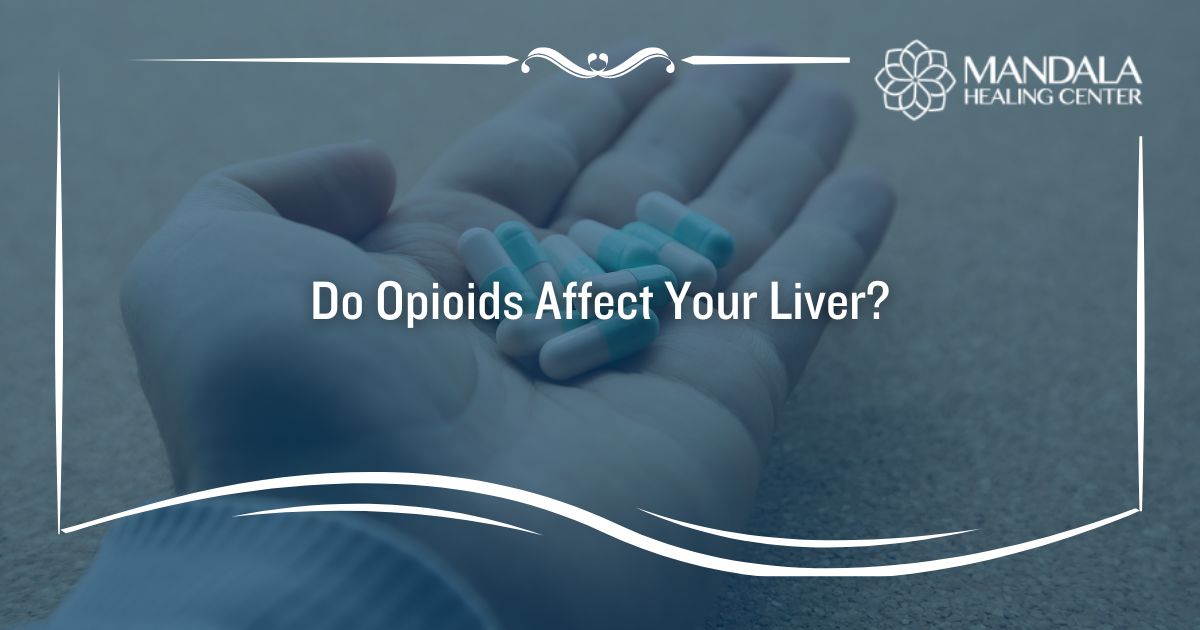Opioids are a class of drugs that include prescription painkillers like oxycodone or hydrocodone and illicit substances like heroin. All opioids have a high potential for dependency and addiction when misused, whether you are buying them off of the street or receiving a prescription. Unfortunately, opioid addiction often leads to a wide variety of health concerns, including life-threatening overdoses.
According to the Centers for Disease Control and Prevention (CDC), “Over 75% of the nearly 107,000 drug overdose deaths in 2021 involved an opioid.”[1]
In addition to the risk of overdosing, long-term opioid abuse can significantly harm your body. Because of the opioid overdose epidemic, many of the long-term risks of opioid abuse are not discussed as frequently. One of the main risks of continuous opioid abuse is damage to your liver.
Signs of Opioid Addiction
It is common for people struggling with opioid use disorder to have a hard time recognizing the signs of addiction in themselves.
The signs of an opioid addiction include:[2]
- Taking opioids in larger amounts or for longer than intended
- Wanting to quit using opioids but being unsuccessful
- Experiencing strong urges or cravings to use opioids
- Failing to complete responsibilities at home, school, or work because of opioid use
- Continuing to use opioids despite experiencing interpersonal issues
- Using opioids in risky situations, such as while driving
- Losing interest in previously enjoyed activities to have more time to abuse opioids
- Continuing to use opioids despite facing mental or physical health complications
- Developing a tolerance for opioids or needing a higher dose to experience the desired effect
- Developing withdrawal symptoms when you cannot abuse opioids
If you or a loved one experiences the symptoms mentioned above, you most likely suffer from opioid addiction. Thankfully, drug addiction treatment programs can offer you the tools and support you need to achieve long-term sobriety.
How Does Long-Term Opioid Abuse Affect Your Liver?
There are a few ways that opioid abuse can lead to liver damage. First, some opioid medications contain acetaminophen. When you are abusing these medications, that means you are consuming large amounts of acetaminophen at once, which can lead to liver damage over time.
Additionally, opioids are metabolized in the liver, which means the organ has to work hard to break it down. When you are ingesting large doses of opioids at once, they might compound in your liver before it has had time to flush them out of your system properly. This build-up can lead to liver damage over time.
Lastly, opioid overdoses can significantly impact the health of your liver. According to the National Institutes of Health (NIH), opioid overdoses can “cause ischemic liver injury due to respiratory failure, cardiovascular collapse, shock and anoxia.”[3]
Other Long-Term Risks of Opioid Abuse
While opioid abuse can do some significant damage to your liver, it can also harm other areas of your body. The gastrointestinal system, respiratory system, and cardiovascular system can all be damaged by long-term opioid abuse.
Long-term opioid abuse can cause damage to the following parts of your body:
Gastrointestinal System
One of the most recognized side effects of long-term opioid abuse is recurrent and chronic constipation. While constipation might not seem serious, it can result in bowel obstruction, which is life-threatening in many cases.[4]
Other gastrointestinal risks of long-term opioid abuse include nausea and vomiting, stomach cramps, and bloating.
Respiratory System
Opioid abuse causes slow or irregular breathing because of how the substance affects your respiratory system. When you take too large of a dose of opioids, you could experience an overdose that is characterized by dangerously slowed breathing or complete respiratory arrest.
Slowed and stopped breathing from opioids can result in a lack of oxygen to your brain, which may cause effects such as coma, brain damage, and even death.
Cardiovascular System
Another area of your body that is affected by long-term opioid abuse is your cardiovascular system. For example, a study published by the American Heart Association (AHA) reports that opioid abuse can lead to atrial fibrillation, stroke, heart failure, and even death.[5]
Find Help for Opioid Abuse and Addiction
If you or a loved one suffers from opioid addiction, it’s time to seek help. Not only can long-term opioid abuse affect your liver, but it can cause damage to almost every system in your body. Thankfully, drug rehab programs can help you learn how to live a substance-free life.
At Mandala Healing Center, we inspire healing in our patients through compassionate care. Going beyond the conventional approach of detoxification, patients at our facility are inspired to fully heal in an environment designed to nourish their entire being.
To learn more about our opioid rehab program, contact Mandala Healing Center today.
References:
- The Centers for Disease Control and Prevention (CDC): Understanding the Opioid Overdose Epidemic, Retrieved December 2023 From https://www.cdc.gov/opioids/basics/epidemic.html
- The American Society of Addiction Medicine (ASAM): DSM-5 Criteria for Diagnosis of Opioid Use Disorder, Retrieved December 2023 From https://www.asam.org/docs/default-source/education-docs/dsm-5-dx-oud-8-28-2017.pdf
- The National Institutes of Health (NIH): Opioids, Retrieved December 2023 From https://www.ncbi.nlm.nih.gov/books/NBK547864/
- The National Library of Medicine (NLM): Opioid-induced bowel dysfunction, Retrieved December 2023 From https://pubmed.ncbi.nlm.nih.gov/12656645/
- The American Heart Association (AHA): Opioid Use and Its Relationship to Cardiovascular Disease and Brain Health: A Presidential Advisory From the American Heart Association, Retrieved December 2023 From https://www.ahajournals.org/doi/full/10.1161/CIR.0000000000001007












